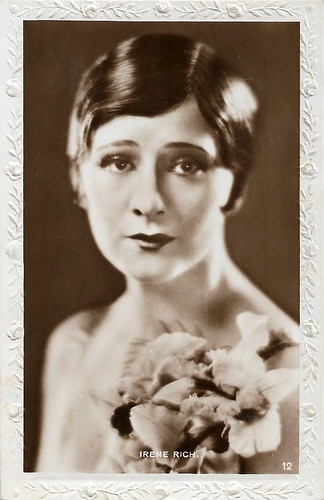
British Real photograph postcard, no. 82. Irene Rich.

British postcard in the Pictures Portrait Gallery Series, London, no. 171. Bert Lytell.
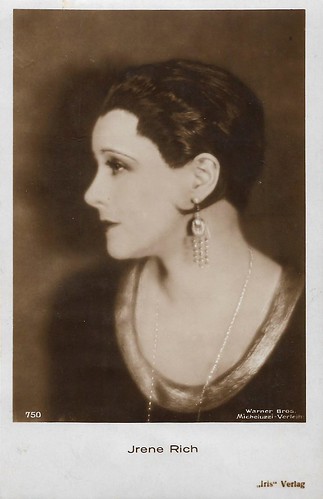
Austrian postcard by Iris Verlag, no. 750. Photo: Warner Bros. / Micheluzzi-Verleih. Irene Rich.
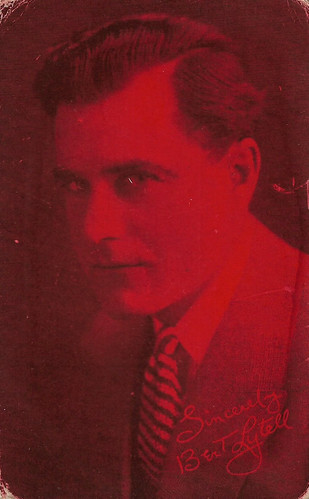
American Arcade card. Bert Lytell.
Irene Rich
American actress Irene Rich was born Irene Luther in Buffalo, New York, in 1891. At a young age, she moved from New York to California with her parents. After her schooling, she first began working as a real estate agent and initially aspired to a middle-class life. She married twice in that period, divorced just as many times, and became the mother of two daughters, Frances and Jane. Frances Rich (1910-2007) also became an actress in the 1930s and later worked as a sculptor. Despite her divorce, she kept the last name Rich as her actor's name.
Her career as an actress began in 1918, as an extra in Jerome Storm's silent film A Desert Wooing. She landed a major role in her next film, The Girl in His House (Thomas R. Mills, 1919). Irene Rich was a sought-after character actress in the silent era, appearing in 10 feature films in 1922 alone. Rich worked for Will Rogers, who used her in eight pictures, including Water Water Everywhere (1920), The Strange Boarder (1920), Jes' Call Me Jim (1920), Boys Will Be Boys (1921), and The Ropin' Fool (1921).
She often portrayed society women, such as the Queen in Ernst Lubitsch's Rosita (1923) starring Mary Pickford, the Duchess of York in Beau Brummel (Harry Beaumont, 1924) starring John Barrymore, and Mrs Erlynne in Lubitsch's Lady Windermere's Fan (Ernst Lubitsch, 1925), starring May McAvoy and Ronald Colman. She was also able to survive the switch to talkies in the late 1920s without much difficulty, e.g. playing Jackie Cooper's mother Linda in The Champ (King Vidor, 1931). After a career gap in the mid-1930s, she returned towards the end of the decade, again playing mothers such as Deanna Durbin's mother in That Certain Age (Edward Ludwig, 1938), and John Agar's mother and Shirley Temple's future mother-in-law in Fort Apache (John Ford, 1948), her penultimate film. Rich continued her screen career until 1948, appearing in a total of 112 American films.
In 1933, Irene Rich began 'The Irene Rich Show', one of the most successful radio programmes of the time, which was heard throughout the United States for over a decade, until 1944. In the theatre, she appeared twice on Broadway, in a play in 1935, then in a successful musical from 1948 to 1950.
At the end of the 1940s, she met her future fourth husband, the businessman George Henry Clifford, whom she married in 1950. Because of the prosperity, he could now offer her, she withdrew from acting into private life from then on. Not much is known about Rich's later life. In 1988, Rich died in Hope Ranch, a suburb of Santa Barbara, at the age of 96. As a result of her two careers in film and radio, Irene Rich has two stars dedicated to her on the Hollywood Boulevard Walk of Fame, one for her radio work and the other for her contribution to film.
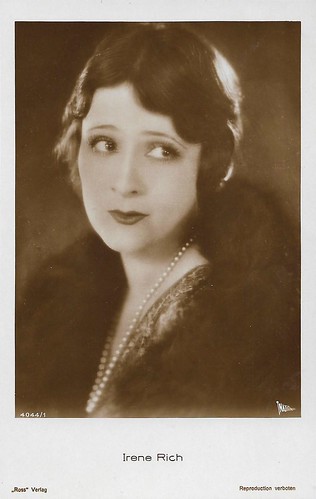
German postcard by Ross Verlag, no. 4044/1, 1929-1930. Photo: National.
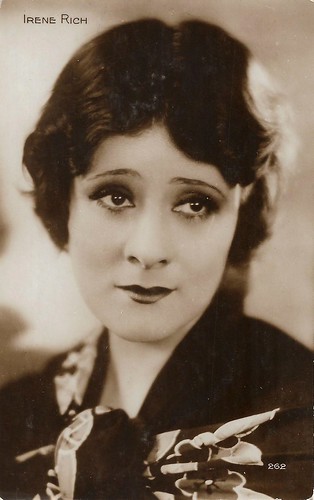
French postcard by Cinémagazine-Edition, no. 262.
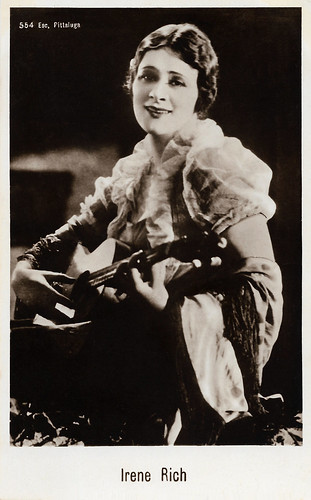
Italian postcard by G.B. Falci, Editore, Milano, no. 554. Photo: Esc. Pittaluga.

German postcard by Ross Verlag, no. 161/3. Photo: Metro-Goldwyn-Mayer Jackie Cooper and Irene Rich in The Champ (King Vidor, 1931).
Bert Lytell
American actor, producer (film and stage), director and screenwriter Bertram 'Bert' Lytell was born in 1885 in New York City, New York. Lytell was the son of actor, author, and producer William H. Lytell and Blanche Mortimer. His mother was an actress before she married, and her father and grandfather were actors. Lytell left Upper Canada College at age 16 to become an actor. His stage acting debut came with the Columbia Stock Company in Newark, New Jersey, when he was 17 years old. He went on to appear with stock theatre companies in Boston, Honolulu, Los Angeles, New Orleans, and Rochester, in addition to heading his own stock troupes in Albany, New York, and San Francisco. He appeared with Marie Dressler in her 1914 Broadway play, 'A Mix-Up'. He also performed in vaudeville in the 1920s with the one-act play 'The Valiant'.
In cinema, Bert Lytell was most active during the silent era, appearing in forty-nine American films released between 1917 and 1927. In 1917, Lytell made his film debut starring as Michael Lanyard in The Lone Wolf (Herbert Brenon, 1917). He subsequently made four Lone Wolf sequels, ending with The Last of the Lone Wolf (Richard Boleslawski, 1930). He also starred as Boston Blackie in Boston Blackie's Little Pal (E. Mason Hopper, 1918) and Blackie's Redemption (John Ince, 1919).
His female partners included Betty Compson in two films including A King's Favourite (George Fitzmaurice, 1922), Alice Lake (three films), Barbara La Marr (two films), May McAvoy in A King's Favourite (1925) and in Ernst Lubitsch's Lady Windermere's Fan (1925), Irene Rich (two films in 1925), Rosemary Theby (five films), Virginia Valli (four films), Lois Wilson (two films), and Claire Windsor (three films). Windsor was also his first wife. After the silent period, Lytell played the lead in only five talkies. The first was On Trial (Archie Mayo, 1928), with Pauline Frederick, and the last was The Single Sin (William Nigh, 1931), with Kay Johnson. He also made two cameos, first in the short film The Stolen Jewels (William C. McGann, 1931), with Wallace Beery and Buster Keaton, and finally in Frank Borzage's Cabaret of the Stars (1943).
After he retired from the silver screen, Bert Lytell continued his acting career in the theatre. In particular, he played until 1946 on Broadway, where he had started in 1914. On the New York stage, he acted alongside Kirk Douglas, Ruth Gordon, Otto Preminger and Margaret Sullavan. He also took part in the creation of the musical 'Lady in the Dark' in 1941, with music by Kurt Weill and with Gertrude Lawrence in the title role. He also appeared on television from 1948 to 1953 in six series, including an episode in Tales of Tomorrow (1951).
Besides acting, Bert Lytell was a director (Along Came Love in 1936, with Charles Starrett and H. B. Warner), producer (a play on Broadway in 1934-1935 and a film in 1936) and screenwriter (two silent films in 1918). Bert Lytell died in 1954 in New York. For his contribution to film, he has a star on the Hollywood Boulevard Walk of Fame. Lytell married the silent film actress Claire Windsor in 1925; they divorced in 1927. His younger brother, Wilfred Lytell (1891–1954), also became a stage and screen actor.
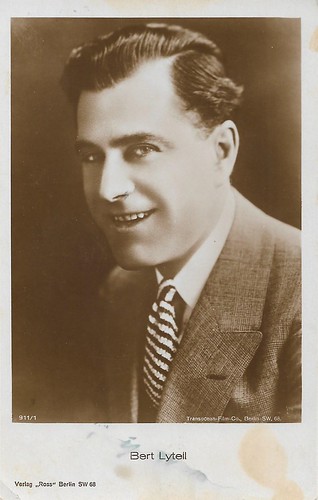
German postcard by Ross Verlag, no. 911/1, 1925-1926. Photo: Transocean-Film-Co., Berlin.

Belgian postcard by Ed. Weekblad Cinema, Antwerp.
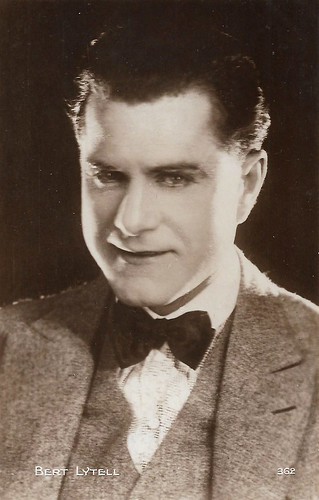
French postcard by Cinémagazine-Edition, no. 362.

German postcard by Ross Verlag, no. 581/2, 1919-1924. Photo: B.B.B. Collection: Didier Hanson. Ernst Lubitsch and Mary Pickford.
Sources: Wikipedia (English, German and French) and IMDb.
This post was last updated on 17 April 2025.
No comments:
Post a Comment